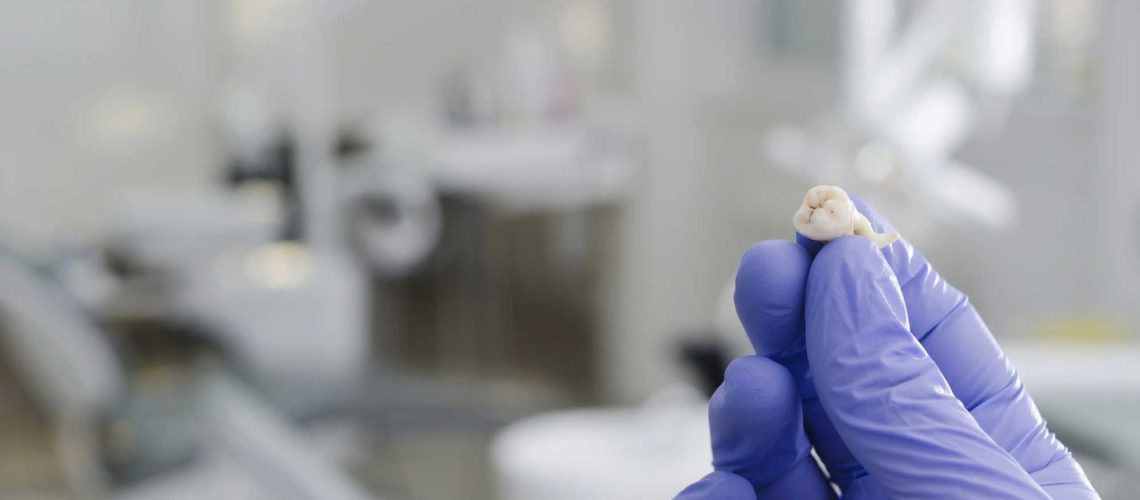Wisdom teeth, also known as third molars, often make their debut in our late teens or early twenties. These molars served a purpose long ago when our ancestors consumed a tougher diet, but in modern times, they often cause more problems than benefits. This comprehensive guide will delve into the significance of wisdom teeth removal, the extraction process, and post-operative care, all while highlighting why it is essential for your oral health.
Problems With Impacted Wisdom Teeth
Impacted wisdom teeth, those struggling to grow properly or emerging at unusual angles within the mouth, can bring forth a range of dental challenges. Among these issues, pain and discomfort stand as prominent concerns. As these molars exert pressure on surrounding gum tissue and adjacent teeth, they often lead to persistent throbbing pain and soreness. This discomfort can extend throughout the jaw, causing headaches and hindering mouth opening. Moreover, the inflamed and swollen gum tissue around impacted wisdom teeth creates an environment conducive to infections and gum disease, posing risks not only to these molars but also to nearby teeth and supporting bones.
In some instances, impacted wisdom teeth can give rise to the formation of cysts or tumors within the jawbone, albeit infrequently. These growths may progressively damage the bone and adjacent teeth, underscoring the urgency of addressing impacted wisdom teeth promptly. Furthermore, when wisdom teeth do manage to emerge, their misalignment with the rest of the teeth, often due to limited space, can result in tooth crowding. This can adversely affect the bite and overall dental alignment, sometimes necessitating orthodontic intervention for correction.
Maintaining oral hygiene around impacted wisdom teeth proves to be a significant challenge. Positioned at the back of the mouth and frequently concealed by gum tissue, these molars make it difficult to uphold proper oral hygiene practices in these areas. Consequently, the risk of tooth decay and gum disease escalates not only for the wisdom teeth themselves but also for the adjacent molars. Given these multifaceted concerns, addressing impacted wisdom teeth in a timely manner emerges as an important step in preserving overall dental well-being.
What Are The Benefits Of Wisdom Teeth Removal
Understanding the advantages of wisdom teeth removal can shed light on the significance of this dental procedure for your overall oral health.
Prevention Of Tooth Crowding And Misalignment
One of the primary benefits of wisdom teeth removal is the prevention of tooth crowding and misalignment. In most cases, there is simply not enough space in the mouth to accommodate these additional molars. As a result, wisdom teeth can push against neighboring teeth, causing them to shift out of their proper alignment. This can lead to orthodontic issues, necessitating braces or other corrective measures to restore a straight and healthy smile.
Elimination Of Pain And Discomfort
Impacted wisdom teeth, which are unable to grow correctly due to limited space, can lead to significant pain and discomfort. They can push against the surrounding gum tissue and adjacent teeth, causing persistent throbbing pain, jaw pain, and even headaches. Wisdom teeth removal offers relief from this discomfort, enhancing your overall quality of life and well-being.
Prevention Of Gum Disease
Wisdom teeth, when impacted or improperly aligned, can create pockets in the gum tissue where food particles and bacteria can easily accumulate. This can lead to the development of gum disease, which can affect not only the wisdom teeth but also nearby teeth and their supporting structures. Removing wisdom teeth reduces the risk of gum disease and its associated complications, such as infection and bone loss.
Minimization of Tooth Decay
Cleaning wisdom teeth can be challenging due to their location at the back of the mouth. As a result, they are more susceptible to tooth decay and cavities. Wisdom teeth removal eliminates this concern, ensuring that your oral hygiene routine remains effective and that your teeth remain healthy and free from decay.
Prevention Of Oral Infections
Impacted wisdom teeth are prone to infections due to the difficulty in keeping the surrounding area clean. These infections can lead to more severe oral health problems if left untreated. Removing wisdom teeth reduces the risk of oral infections and the need for extensive dental treatment to address complications.
Enhanced Oral Hygiene
After wisdom teeth removal, maintaining proper oral hygiene becomes more manageable. With these extra molars out of the way, it is easier to brush, floss, and clean the entire mouth effectively, reducing the risk of plaque buildup, cavities, and gum disease.
Wisdom Teeth Removal: The Process
Wisdom teeth extraction is a routine dental procedure aimed at addressing issues arising from the emergence of third molars, often in late adolescence or early adulthood. The process involves an initial consultation, where your dental professional assesses the need for extraction, followed by anesthesia administration for comfort.
An incision is made to access the wisdom tooth, which is then removed, and the site is cleaned and stitched. Gauze is placed to control bleeding, and you’ll receive post-operative instructions. Wisdom teeth extraction, when performed by a skilled dentist or oral surgeon, ensures your oral health remains optimal and pain-free.
Post Wisdom Tooth Extractions
Following wisdom teeth removal, a critical phase of healing unfolds. Initially, expect some swelling and discomfort, typical responses to the procedure. As your body’s recuperation process begins, it’s essential to take it easy and allow the anesthesia to wear off. Mild bleeding can occur but can be managed by gently biting on the provided gauze. Pain and discomfort, lasting a few days, can be alleviated with prescribed or over-the-counter pain medication.
Swelling, most prominent in the first 24 to 48 hours, can be reduced with intermittent ice pack applications. A soft diet comprising foods like yogurt and mashed potatoes is advisable to prevent irritation or damage to the surgical sites. While maintaining oral hygiene is crucial, gentle rinsing with warm salt water after the initial 24 hours and careful brushing and flossing around the extraction sites are recommended. Adequate rest and avoidance of strenuous activities are essential for initial healing.
Follow-up appointments may be scheduled to monitor your progress and remove stitches, if necessary. Full recovery may take several weeks as gum tissue closes, and bone gradually fills the space left by the removed tooth. Remember, while everyone’s healing process is unique, diligent adherence to post-operative care instructions and open communication with your dental professional ensures a smooth recovery.
What Does Wisdom Tooth Removal Cost And Is It Covered By Insurance?
The cost of wisdom tooth removal can vary widely depending on factors such as the complexity of the extraction, the need for local anesthesia or sedation, and your location. Generally, a straightforward wisdom tooth extraction can range from $75 to $200 per tooth. However, if the extraction is more complex or requires surgical intervention, the cost may increase.
As for insurance coverage, many dental insurance plans provide partial coverage for wisdom tooth extractions, particularly when the procedure is deemed medically necessary due to issues like impaction, infection, or severe pain caused by the growing wisdom teeth. However, coverage can vary significantly from one plan to another, so it’s crucial to check with your insurance provider to understand the extent of your coverage and any out-of-pocket expenses you may incur.
Additionally, your dentist or oral surgeon’s office can assist in verifying your insurance benefits and providing an estimate of the expected costs. It’s advisable to discuss the financial aspects of wisdom tooth removal with your dental provider before the procedure to make an informed decision based on your individual circumstances.
Final Thoughts
In the journey of oral health, the chapter on wisdom teeth is one that many will encounter. These often unruly third molars, attempting to assert their presence as they grow, can pose challenges. However, the decision to have wisdom teeth removed is a proactive step towards maintaining a healthy smile. The procedure itself, while requiring attention and care during the initial healing phase to protect the vital blood clot formation, ultimately leads to relief from potential pain and discomfort.
With proper guidance from dental professionals, timely intervention can ensure that the path forward is one of continued oral health and well-being. The decision to have wisdom teeth removed is a proactive choice that ultimately promotes a healthier, pain-free, and enduring smile.




